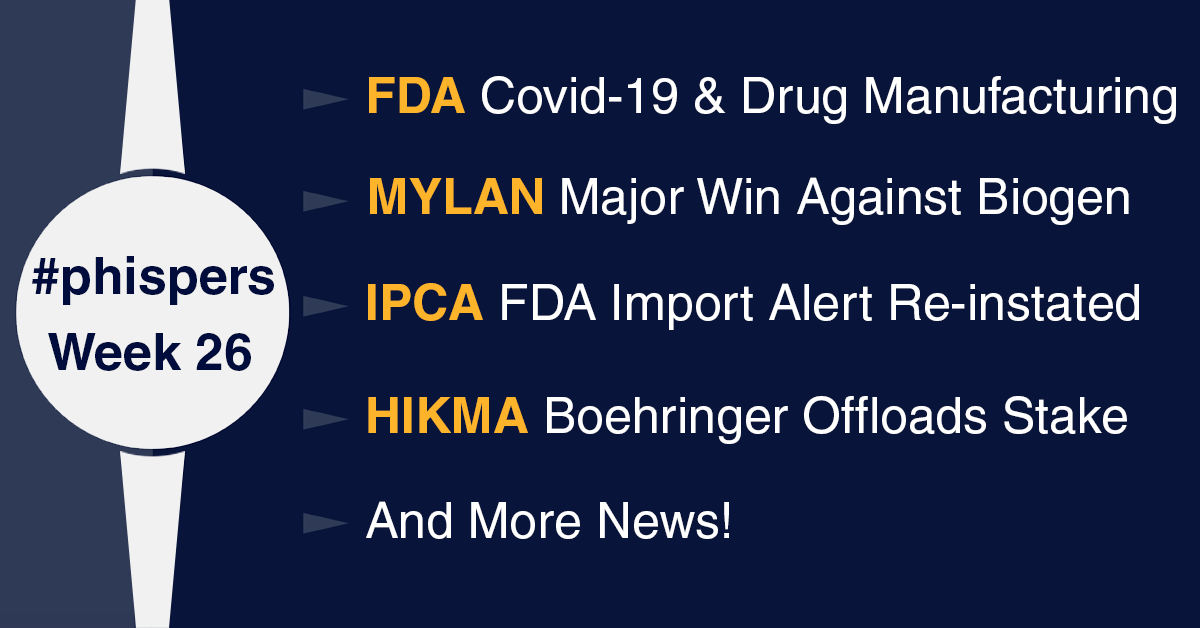
By PharmaCompass
2020-06-25
Impressions: 77844
This week, Phispers brings you news on a GMP guidance document issued by the US Food and Drug Administration for responding to Covid-19 infection in employees in drug and biological products manufacturing.
Biogen saw its key patent on its multiple sclerosis drug, Tecfidera get invalidated by a federal court in the US.
As a result, its competitor — Mylan — can introduce a generic Tecfidera as early as this year.
In Covid updates, Gilead will start trials on an inhaled version of Remdesivir.
It is also beginning trials for a pediatric version of the investigational antiviral drug.
While Indian drugmakers — Cipla and Hetero — launched generic versions of Remdesivir, Novartis and NIH announced that they have discontinued their studies on hydroxychloroquine.
Boehringer Ingelheim Invest GmbH announced its intention to exit in full its investment in Hikma Pharmaceuticals.
Gilead announced it will acquire a 49.9 percent stake in Pionyr Immunotherapeutics Inc, a privately held company developing cancer immunotherapies.
And the FDA put Indian drugmaker Ipca back on its import alert as the agency found that the US no longer faced a shortage of chloroquine phosphate.
FDA issues GMP guidance for responding to Covid-19 in employees of drug plants
The US Food and Drug Administration (FDA) issued a guidance document on good manufacturing practice considerations for responding to Covid-19 infection in employees in drug and biological products manufacturing. The guidance applies to all manufacturers of human or animal active pharmaceutical ingredients (APIs), prescription drugs, over-the-counter (OTC) drugs, biological drug products, as well as drugs prepared by outsourcing facilities or compounding pharmacies.
The FDA guidance expects drug manufacturers to prevent or mitigate potential adverse effects on the safety and quality of drugs from an infected or potentially-infected employee engaged in drug manufacturing.
The 13-page document says manufacturers should vigilantly monitor employees who perform drug manufacturing functions and have been exposed to others with confirmed or suspected symptoms of Covid-19. Employees who test positive for Covid-19 (regardless of whether they have symptoms) must be excluded from drug manufacturing areas. The FDA recommends that infected employees should not return to work in such areas until the CDC’s criteria to discontinue home isolation are met, in consultation with healthcare providers.
To ensure compliance with cGMP requirements, drug product manufacturers must also ensure that employees practice good sanitation and health habits. Drug manufacturers are expected to take steps to prevent or mitigate potential adverse effects on the safety and quality of drugs from infected employees.
As part of this evaluation, manufacturers are expected to evaluate the adequacy of the cGMP controls already in place to protect materials, components, drug container closures, in-process materials, and/or drugs from sick employees in the context of this new coronavirus. For example, cleanroom process controls such as air filtration, positive air pressure and movement of air to ensure proper function should all be reviewed. If needed, companies should implement additional controls to eliminate or minimize the risk of contamination.
For biological products where manufacturing processes or materials are more susceptible to viral contamination, FDA recommends that manufacturers perform a risk assessment of the current viral control strategy in light of SARS-CoV-2 and implement appropriate mitigation strategies.
There is also an expectation that companies will clean and sanitize non-production areas (such as offices, elevators, break rooms, changing rooms, and restrooms) more frequently, update existing procedures to institute more frequent cleaning, sanitization, and/or sterilization of surfaces in the production areas.
Manufacturers are also requested to consider further restrictions on employee access to any manufacturing area to limit the possibility of contamination.
Additionally, the FDA recommends that API manufacturers have procedures in place to ensure that all evaluations of production controls (including risk assessments), follow-up, and changes are approved by the manufacturer’s quality unit and documented within the manufacturer’s quality management system.
Mylan scores major win against Biogen’s blockbuster MS drug
This week, Mylan got a shot in the arm as its competitor Biogen saw its key patent on its multiple sclerosis drug Tecfidera get invalidated by the West Virginia federal court in the US. This judgement allows Mylan to introduce a generic version of Tecfidera as early as this year — eight years earlier than when low-priced competition for the blockbuster drug was expected to arrive.
According to the West Virginia court ruling, Mylan had established that the asserted claims of Biogen’s patent were invalid.
Since the drug’s launch in 2013, Tecfidera has been the main growth driver for Biogen. It generated sales of US$ 4.43 billion in 2019, and accounts for a third of Biogen’s total revenues.
The patent loss is a major setback for Biogen, though the company has said it will appeal the decision. However, the appeal process could take up to a year, Citi analyst Mohit Bansal told Reuters. According to the analyst, Biogen may seek an emergency order to prevent Mylan from launching its generic version during the time.
Boehringer to offload its entire stake in Hikma
This week, Boehringer Ingelheim Invest GmbH announced its intention to exit in full its investment in Hikma Pharmaceuticals Plc valued at US$ 1.24 billion (GBP 1 billion). Boehringer Ingelheim is selling its stake to institutional investors and the rest back to the company.
A book-runner for the deal said Boehringer would sell 28 million shares, worth about US$ 872.90 million (GBP 700 million), while Hikma said it would purchase the remaining shares for not more than US$ 366.6 million (GBP 295 million).
Germany-based private firm Boehringer currently holds 16.45 percent, or roughly 40 million, of Hikma’s share capital and voting rights, according to Refinitiv Eikon data, making it the drugmaker’s second-biggest shareholder after Darhold Ltd.
Back in 2015, Boehringer Ingelheim had signed an agreement for the sale of its US generic pharmaceutical business — Roxane Laboratories, Inc — and its manufacturing supply chain affiliate Boehringer Ingelheim Roxane, Inc, collectively known as Roxane Labs, Inc (Roxane) to Hikma Pharmaceuticals Plc (Hikma).
Under the terms of the agreement, Hikma purchased 100 percent of the stock of Roxane, and, in exchange, Boehringer Ingelheim received cash and stock in Hikma. Through the agreement, Boehringer Ingelheim took a material position as a shareholder in Hikma.
Gilead Sciences secures exclusive option to acquire Pionyr Immunotherapeutics
Even as all eyes were on Gilead’s investigational drug Remdesivir for Covid-19, the company was busy deepening it oncology pipeline.
This week, Gilead announced it will acquire a 49.9 percent stake in Pionyr Immunotherapeutics Inc for US$ 275 million. Pionyr is a privately held company developing cancer immunotherapies.
Pionyr’s Myeloid Tuning trademark technology is based on the discovery that altering the tumor microenvironment to favor immune-activating cells over immune-suppressing cells enhances the body’s ability to combat cancer, particularly in combination with checkpoint inhibitors.
These therapies are designed to treat patients who don’t benefit from checkpoint inhibitors. Two of its compounds — PY314 and PY159 — have shown efficacy in preclinical studies.
Gilead also has the exclusive option to purchase the remaining equity. Gilead may exercise its exclusive option upon completion of Phase 1b studies for PY314 and PY159, or at an earlier time if Gilead chooses to do so, for a US$ 315 million option exercise fee and up to US$ 1.15 billion in potential future milestone payments.
In addition, Gilead will provide Pionyr with additional funding for the PY314 and PY159 clinical programs, as well as ongoing research and development programs. Pionyr plans to file Investigational New Drug (IND) applications with the US Food and Drug Administration (FDA) in the third quarter of this year.
The transaction is subject to customary closing conditions and is expected to close shortly.
Ipca back on FDA import alert after US meets its shortage of chloroquine
In March, the US Food and Drug Administration (FDA) had partially lifted an import alert on the company’s two plants to ensure the supply of chloroquine tablets. The exemption had allowed Ipca to export APls chloroquine phosphate and hydroxychloroquine sulfate from the company's APIs manufacturing facility situated at Ratlam (Madhya Pradesh).
At that time, the FDA had taken the step as chloroquine was considered one of the possible treatments for the Covid-19 by the US Centre for Disease Control (CDC).
Earlier this week, the FDA communicated to the company that shortage implications for chloroquine phosphate API have changed and chloroquine phosphate drug products are no longer in short supply and therefore, no shipment of API chloroquine phosphate will be excluded from the import alert.
FDA has also informed that due to potential shortage implications and/or medical necessity, exception to the import alert has been made for API hydroxychloroquine sulfate. FDA has said this exception will be re-considered if the shortage implications change.
Covid updates: Gilead to start trials on inhaled, pediatric versions of Remdesivir
Buoyed by the FDA’s emergency use authorization for Remdesivir for the treatment of patients with Covid-19, Gilead is now starting trials of an inhaled version of the investigational, anti-viral drug.
In April, the company had said it was looking to develop easier-to-administer versions of the drug, including an inhaled version. Remdesivir can’t be administered in pill form because its chemical makeup would impact the liver, the company had said.
“We will screen healthy volunteers for Phase 1 trials this week and hope to begin studies in patients with Covid-19 in August. If the trials are successful, this could represent important progress…” Daniel O’Day, Chairman and CEO of Gilead Sciences, said in a letter.
Remdesivir is currently being given to patients intravenously through daily infusions in the hospital. An inhaled formulation would be given through a nebulizer, and this could allow for easier administration of the drug outside of the hospital in patients who are in early stages of the disease. Therefore, this could be an effective means of stemming the tide of the pandemic.
So far, randomized controlled trials of Remdesivir have been evaluating its safety and efficacy in hospitalized patients. In a study undertaken by the National Institute of Allergy and Infectious Diseases (NIAID), Remdesivir shortened recovery time by an average of four days. In a study being undertaken by Gilead of moderately ill patients (those in hospital but not requiring oxygen), — known as SIMPLE — individuals on a five-day course of Remdesivir had better clinical outcomes than those receiving standard of care.
Gilead is also beginning a clinical trial for children. “While the novel coronavirus appears to disproportionally affect adults”, concerning reports have been documented of “children and young adults being hospitalized with Covid-19 and related autoimmune symptoms”, Gilead said.
The study will treat approximately 50 children — from newborns to adolescents — who are hospitalized with Covid-19. “We are also collaborating with an external group on a study in pregnant women, and we are planning a trial for patients with end-stage renal disease”, O’Day said. The company hopes to manufacture over two million Remdesivir treatment courses by the end of the year and many millions more by 2021.
Indian drugmakers supply generic Remdesivir: In India, drugmakers Hetero Lab and Cipla are all set to supply generic Remdesivir to hospitals in Delhi, Mumbai and Chennai this week. The drugmakers received an emergency marketing approval from the Drug Controller General of India late last week to supply the experimental Covid-19 drug to hospitals.
Cipla and Hetero have signed licensing agreements with Gilead to make and sell the drug in 127 low- and middle-income countries.
According to reports, Hetero Labs has priced its generic Remdesivir at a rather steep US$ 71 (INR 5,400) per 100-milligram vial. It is shipping the vials to hospitals across India. Hetero said it would supply 20,000 vials of the drug. Cipla Ltd has priced its generic version a tad bit lower — at around US$ 66 (less than INR 5,000).
Novartis, NIH discontinue HCQ studies: Swiss drugmaker Novartis said it has decided to stop and discontinue its sponsored hydroxychloroquine (HCQ) clinical trial for Covid-19 due to acute enrollment challenges that have made the completion of the trial infeasible.
“The recruitment challenge facing our HCQ trial has made it unlikely that the clinical team will be able to collect meaningful data in a reasonable timeframe to determine the effectiveness of HCQ in treating patients with Covid-19. No safety issues have been reported, and there are no conclusions on efficacy from the study”, the company said.
Similarly, in the US, the National Institutes of Health (NIH) has stopped a clinical trial to evaluate the safety and effectiveness of HCQ for the treatment of adults hospitalized with Covid-19. A data and safety monitoring board met last week and determined that while there was no harm, the drug was very unlikely to be beneficial to hospitalized patients with Covid-19.
The PharmaCompass Newsletter – Sign Up, Stay Ahead
Feedback, help us to improve. Click here
Image Credit : #Phisper Infographic by SCORR MARKETING & PharmaCompass is licensed under CC BY 2.0
“ The article is based on the information available in public and which the author believes to be true. The author is not disseminating any information, which the author believes or knows, is confidential or in conflict with the privacy of any person. The views expressed or information supplied through this article is mere opinion and observation of the author. The author does not intend to defame, insult or, cause loss or damage to anyone, in any manner, through this article.”







